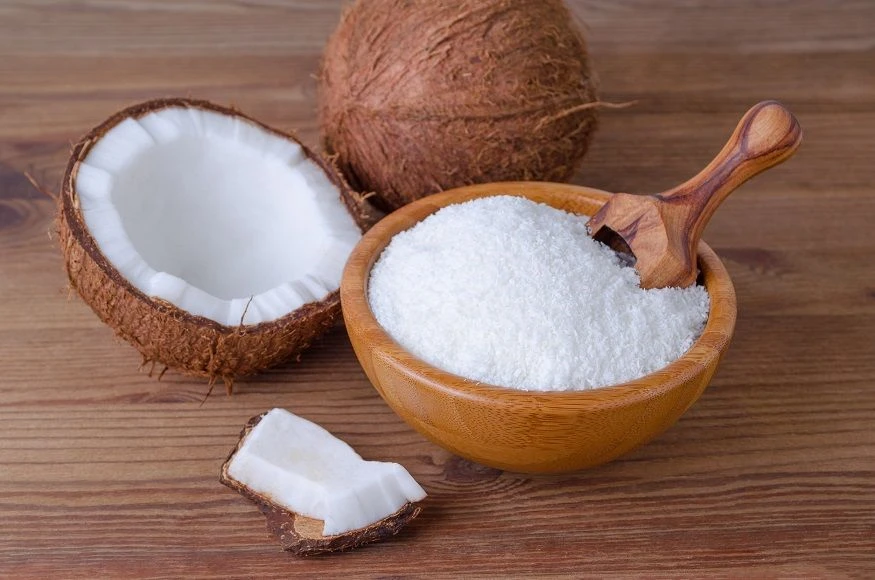by Christopher Jones
We all know what a coconut is, and what they are used for.
Whether they are used in milk, desserts, or mixed with fruit and rum to make pina coladas, coconuts have all kinds of uses and we are all familiar with them.
What, then, is a desiccated coconut, and what are they used for? Before answering that, it is important to know what happens to something when it is desiccated.
When something is desiccated, all of the moisture is removed, with the item being dried out. There are a lot of fruits that are desiccated: Prunes, apricots, and raisins being the most common.
Simply put, a desiccated coconut is a coconut that is dried out with all of its moisture removed.
Contents
What effect does this have on the coconut itself, and what kinds of uses does it have compared to coconuts that are not desiccated?

When something loses all of its moisture, two things happen.
First, all of the juices that originally contained are now gone. This is noticeable right away if you bite into an apricot or prune. While they are flavorful, they contain no juices.
However, these can still be placed into a food processor or blender to make juice. This juice is not only very flavorful, but it still contains most of its original nutrients. Something else that is desiccated are bananas. These contain zero juice, but if you put them into a blender, you'll get something that does resemble juice.

The second thing that happens when something is desiccated is that all of its nutrients are now concentrated.
For example, what is a raisin? We all know that a raisin is a dried grape, or in this case, a grape that has been desiccated.
Even though they are the two same fruits, they have different properties. Also, the nutrients of raisins are held closer together than grapes. This is what makes raisins different than grapes in their function and even in their nutritional value.
These are the two biggest effects of desiccated items.
How does this affect coconuts in their properties and uses? Does it become something else, like when a grape gets dried out? The answer lies in how it affects their inherent juices and nutrients.
If you were to open a coconut, some coconut juice would spill out. But some of the inner edges of the coconut would still contain a little juice. You'll get most, but not all of the juices from the coconut.
Say you wanted all of the juice from the coconut, since you know about its nutritional value. What would you do?
You would freeze then dry the coconut. This is exactly what people do to "get the most out of" coconuts. The coconut flakes that you come across in snacks and dishes? These are flakes from coconuts that have been frozen and dried. On the surface, nothing happens to a coconut when it is desiccated. However, the inside of a coconut is affected greatly when it is dried.

When a coconut is dried, all of the liquid inside of it not only solidifies, but it also retains most of its nutrients. Some of the nutrients even become more pronounced as well.
Coconuts also are a little more difficult to open when they are dried. This is also a good thing. Coconuts that are not dry can open pretty easily, and this can be troublesome if you are transporting a lot of them.
What Kinds of Properties do Desiccated Coconuts Have Compared to Coconut Juice?
One thing that is useful about dried coconuts is that they often have the same kinds of properties that their original counterparts have. The only real difference between dried coconuts and coconut is that dried coconuts cannot be used in milk or any other fluid that uses coconut juice for flavor.
Dried coconuts contain similar amounts of manganese, copper, dietary fiber, and saturated fat as coconuts that are not dried. The only difference is that they are not in liquid form.
Whether you are consuming them dry or not, you do need to understand that coconuts contain a lot of saturated fat. This is what gives them their flavor, especially when combined with dairy products. There is a reason why dried coconuts are used in select chocolate bars and why coconut juice is used in milk. It adds a lot of flavor.
The properties of dried coconut are a little different from coconuts that are not dried.
For example, it is impossible to use dried coconut in any drink recipe. Once they are desiccated, coconuts become extremely coarse, making it impossible to achieve any texture that could resemble a liquid.

Cutting up dried coconuts and placing them in a blender will not yield the same result as putting bananas in a blender, even though both contain no juice. There is no need to worry if the nutritional value of coconuts are compromised if they are dried, because this is simply not true. When a coconut is desiccated, the only thing that happens is that the juice inside of it solidifies. The nutritional value is still intact and some of their nutrients become so compact that they can provide a different kind of nutritional value.
For example, many say that eating dried coconuts is more healthful than drinking coconut milk.
The only real way to dry a coconut is to freeze it. Contents inside of a coconut, when frozen, also dry up and desiccate naturally. This will allow you to get a lot more out of your coconut if you decide to use its contents in recipes. Do not be afraid to freeze coconuts completely solid and store them in the frozen environment for a long time. While you will not want to do this for other produce since they can lose nutrients when dried, coconuts hardly lose any nutrients when dried.
If you are looking for a flavorful topping for nearly any dish, look no further than shredded dry coconut. The flakes will add flavor to almost anything and will greatly enhance the flavor of nearly everything that it goes on, and it will also enhance the presentation of almost any dish.
 |
 |
 |
 |
 |
 |
 |
 |

About Christopher Jones
Chris is a true globetrotter. He has been to many destinations and tried different types of food from all over the world, yet he still loves finding new places and tasting their specialties. Chris has always had an entrepreneurial spirit and so he decided to go back to school at age 24 for his MBA at University of San Francisco so that he could have a better understanding of business strategy in order to start his own company. His favorite motto is “how can one live well, travel well, and work well without having good food every time?”
Kitchen Goodness
Check for FREE Gifts. Or get our Free Cookbooks right now.
Disable the Ad Block to reveal all the recipes. Once done that, click on any button below
 |
 |
 |
 |